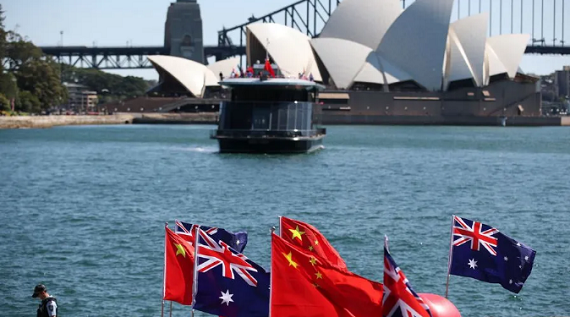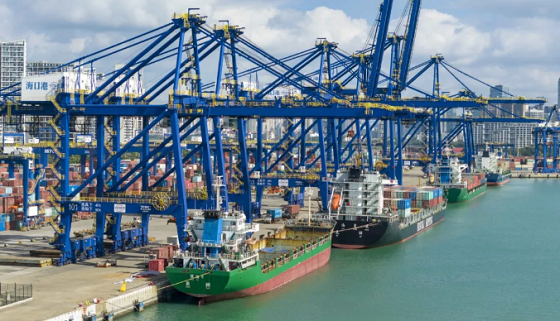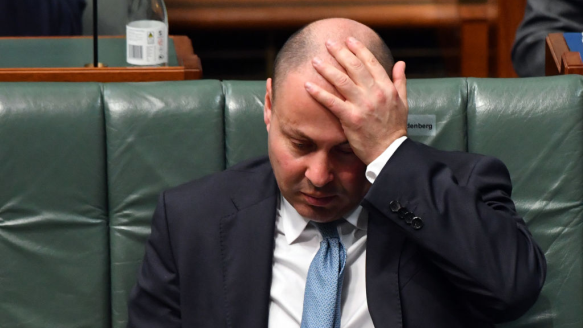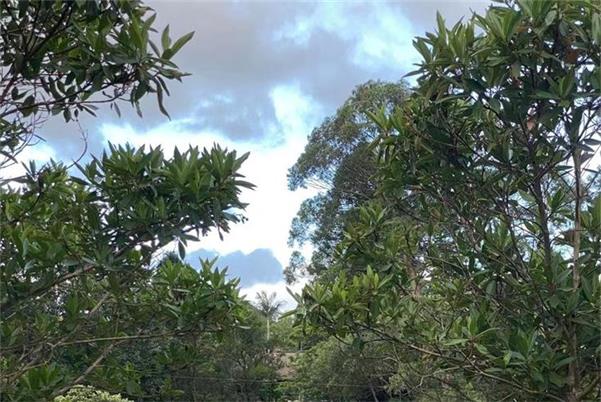Australia's BRI train wreck

An ocean roll-on ship loads vehicle for export to Australia at the port of Lianyungang Oriental Company in Lianyungang, east China's Jiangsu Province, March 13, 2021. /Getty
Editor's note: Daryl Guppy is an international financial technical analysis expert. He has provided weekly Shanghai Index analysis for media for the Chinese mainland for more than a decade. Guppy appears regularly on CNBC Asia and is known as "The Chart Man." He is a national board member of the Australia China Business Council. The article reflects the author's opinions, and not necessarily the views of CGTN.
There is a certain horrid fascination in watching a train wreck unfold in slow motion. This week the Australian Federal Government over turned the Belt and Road Memorandum of Understanding signed by the State of Victoria with China's National Development and Reform Commission in 2018 and 2019. The arrangements were considered to be "inconsistent with Australia's foreign policy or adverse to Australia's foreign relations."
This diplomatic crash delivers business that same horrid train wreck fascination. Australian business knew this crash was inevitable and they know that just as inevitable is the reaction from China and a further freezing of the Australia-China relationship.
Australia's Foreign Arrangements Scheme introduced in December 2020 gave the Foreign Minister the power to overturn deals with foreign nations.
The rejection of the agreement has three aspects. The first is a domestic political squabble. The federal government and some sections of the media have a deep dislike for the Premier of Victoria, Daniel Andrews. The attack on Victoria's BRI agreement is part of a domestic political quarrel.
The second aspect reflects Australia's national rejection of the BRI. So support for the BRI is cast as being against Australia's interests. The Foreign Arrangements Scheme review process is administered by Australia's Foreign Minister Marise Payne and she and other government colleagues have made clear their opposition to the BRI. For the anti-China group in the Australian Federal parliament this is a longed-for victory.
For Victoria there is a weary resigned acceptance of the inevitable. There was never any doubt that these BRI agreements were the primary political target of the Foreign Arrangements Scheme.
As with many MoU's, Victoria's BRI agreements did not commit the state government to specific projects and is not legally binding. The agreements were about co-operation and it's the rejection of this cooperation with China that is one of the more significant features of this decision.
Some federal government ministers believed the Victorian agreement allowed China to split the domestic consensus the government was trying to build on opposition to the BRI.

Aerial photo shows the Chinese-built Maputo Cross-sea Bridge in Maputo, Mozambique, May 8, 2018. /Xinhua
The third aspect has an international impact. Some believed the Victorian agreement also undermined Australia's attempts to convince other regional countries to tread warily before signing investment deals under the BRI or indeed, in accepting COVID-19 assistance from China.
Of course this advice comes too late as many of the RCEP and ASEAN member countries have already signed BRI agreements and some like Singapore are actively seeking further deeper engagement. Ultimately overturning of the MoU and opposition to the BRI is inconsistent with Australia's desire to play a prominent leadership role in RCEP.
Some observers also noted the timing of the announcement that followed China's Deputy Head of Mission, Wang Xining's remarks at the National Press Club. Echoing the global cooperation and respect themes of Chinese President Xi Jinping's speech at the Boao Forum for Asia, Wang Xining noted that China is open for collaboration and co-operation.
The timing of the Foreign Minister's announcement seemed to be a rejection of this olive branch. In August 2020, immediately following Wang Xining's address which suggested ways Australia-China relations could be improved, Prime Minister Scott Morrison also rejected this goodwill and pledged to tear up state agreements with China.
In the immediate aftermath of this week's announcement, and perhaps keen not to get the national government off-side, some business organisations kept a low profile but this may change as their business members express their growing concerns about the loss of opportunities for involvement in BRI partnerships and the longer term impact on Chinese investment in Australia. Research reports have already shown a 61-percent fall in Chinese investment in Australia.
The Belt and Road Initiative is too large and has too much momentum to be hindered by this Australian decision. China's reaction is understandable, but in the larger scheme of events, this is barely a distraction.
For Australian business the impact is more significant because it makes it more difficult for Australian companies to participate in BRI projects. This decision will further close channels of communication with China and reduce opportunities for Australia to encourage China engagement with the region. It makes Australia less attractive as a location for Chinese investment and that's bad for jobs and the Australian economy.
This is a decision driven by short term domestic political in-fighting and backed by those who have no intention of recognizing China's growth or legitimate place in the global order.
Australia faces a complex environment in relation to its engagement with China and the way China's international role is growing. The mixing of domestic politics with international engagement leads to messy solutions which have ill-considered long term impacts. It's a big decision for Australia, but of less importance to China and the BRI. This is a slow moving crash but the consequences may be much more rapid.
(If you want to contribute and have specific expertise, please contact us at opinions@cgtn.com.)
相关阅读

-
澳洲学者:对美国唯命是从的澳大利亚也难逃“美国优先”大棒砸下
澳大利亚长期讨好美国,希望以此免受“美国优先”政策冲击,一边继续享受美国的安全保护,一边维持正常的澳中、澳美贸易关系。但近期特朗普的一系列离谱言行表明,这种期望可能只是幻想。

-
澳洲学者:美国说什么“强化供应链”,到头来还是为打压中国
近日,“印太经济框架” (IPEF) 下的供应链协议生效。事实上,IPEF是美国对华战略竞争的地缘政治工具,它利用其他成员国寻求供应链多元化的本意,完全以美国自身利益和战略目标为出发点,旨在围堵、遏制中国经济。

-
澳专家:G7广岛峰会嘴上说的都是“秩序”,心里想的都是“霸权”
今年七国集团 (G7) 峰会在日本广岛举办,首要议程仍是维护霸权秩序。广岛是第一个遭到核武器袭击摧毁的城市,这一会议地点和G7不断变化的关注焦点相结合,讽刺意味浓烈。G7的成立主要是为了促进共同的宏观经济倡议,以应对当代经济问题,但现在它正蓄势发起经济战。

-
Australia's adversarial China policy
Daryl Guppy is an international financial technical analysis expert. He has provided weekly Shanghai Index analysis for Chinese mainland media for more than a decade. Guppy appears regularly on CNBC Asia and is known as "The Chart Man."

-
China stock market opportunity
Daryl Guppy is an international financial technical analysis expert. He has provided weekly Shanghai Index analysis for Chinese mainland media for more than a decade. Guppy appears regularly on CNBC Asia and is known as "The Chart Man." He is a national board member of the Australia China Business Council. The article reflects the author's opinions and not necessarily the views of CGTN.

-
G7 blue dots or BRI red spots?
Editor's note: Daryl Guppy is an international financial technical analysis expert. He has provided weekly Shanghai Index analysis for Chinese mainland media for more than a decade.

-
Australia on a 'mission to provoke imperial resurrection'
Daryl Guppy is an international financial technical analysis expert. He has provided weekly Shanghai Index analysis for Chinese mainland media for more than a decade.
-
Australia pines for the past
Editor's note: Daryl Guppy is an international financial technical analysis expert and special consultant to AxiCorp. He has provided weekly Shanghai Index analysis for media for the Chinese mainland for more than a decade. Guppy appears regularly on CNBC Asia and is known as "The Chart Man." He is a national board member of the Australia China Business Council. The article reflects the author's opinions and not necessarily the views of CGTN.
免责声明:本网站信息仅供一般参考,不构成投资或财务建议。虽力求准确与完整,但不保证信息的准确性、完整性或时效性。投资有风险,决策前请咨询专业独立顾问。使用本网站即视为接受本免责声明。
热门点击
-
- 【12.16】今日财经时讯及重要市场资讯
-
- 【12.17】今日财经时讯及重要市场资讯
-
- 产业资本山东鑫海战略进驻 Flagship Minerals(ASX: FLG)智利 Pantanillo 金矿项目迈入工程推进关键阶段
-
- 【12.18】今日财经时讯及重要市场资讯
-
- 【12.15】今日财经时讯及重要市场资讯
-
- 重磅投资者密集入场 短短半年吸引1.6亿美元资金 南非610万盎司金矿开发商Theta Gold Mines(ASX:TGM)最新签署8000万美元融资条款书 冲刺2027年初首次黄金浇铸!
-
- 【异动股】再接大额军工订单!Electro Optic Systems (ASX:EOS)与韩国客户有条件签署8000万美元高能激光武器合同
-
- 【12.19】今日财经时讯及重要市场资讯
-
- 重磅投资者密集入场 短短半年吸引1.6亿美元资金 南非610万盎司金矿开发商Theta Gold Mines(ASX:TGM)最新签署8000万美元融资条款书 冲刺2027年初首次黄金浇铸!
-
- 【异动股】Treasury Wine Estates (ASX:TWE) 预警美中业务滑坡 计划削减中国市场库存稳定奔富酒定价
-
- 【异动股】Radiopharm Theranostics (ASX:RAD)暴涨61%:脑转移瘤放射性药物诊疗法RAD 101中期试验92%患者达到主要终点
-
- 摩根大通看好锂市场前景 上调IGO(ASX: IGO)、Liontown Resources(ASX: LTR)股票评级至“增持”
-
- SG Hiscock:新资源周期来临 看好关键矿产和黄金小盘股上涨空间
-
- “救火CEO”携1600万澳元天价薪酬功成身退 赌场巨头Star Entertainment巨震之后期待向阳而生
-
- 美股观察:新高之后 道指何去何从?——周期、浪型与趋势的最新研判(一)



